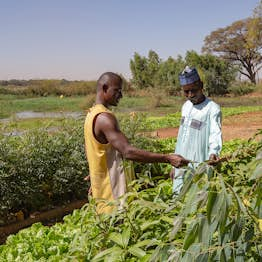Introduction
While keeping an eye on the deteriorating security and political situation, Luxembourg has continued its commitment to health, governance, human rights and regional health in West Africa and the Sahel.
Read more
In the area of combating communicable diseases, including HIV/AIDS, Luxembourg has continued its support for the FEVE IMPULSE project (2021 – 2026) implemented by the international NGO ENDA Santé and by contributing to the 95 – 95-95 strategy of the Joint United Nations Programme on HIV/AIDS (UNAIDS) with a particular focus on vulnerable populations and cross-border cooperation, in ten countries in the sub-region (Benin, Burkina Faso, Cabo Verde, Côte d’Ivoire, Gambia, Guinea-Bissau, Guinea, Mali, Niger, Senegal). Benin and Côte d’Ivoire were added as new countries for intervention in 2022, increasing the total project budget to EUR 7 377 347.
The Luxembourg Development Cooperation has continued the partnership between the Luxembourg Institute of Health, the Centre Hospitalier de Luxembourg, ENDA Santé, Luxembourg’s Laboratoire National de Santé and the Luxembourgish NGO Stop AIDS Now/Access, in order to improve access to diagnostics and treatment for those infected with sexually transmitted diseases in Senegal and Guinea-Bissau (CARES project). Innovation, applied scientific research and the promotion of multi-stakeholder partnerships have become the common threads for this project, which is inspired by United Nations SDG 17 with the aim of building inclusive partnerships for effective cooperation. This commitment in the field of health is complemented by the partnership on universal health coverage with the World Health Organization (since 2013), which Luxembourg is supporting financially with a contribution of EUR 8.8 million from 2022 to 2024.
Beyond the health sector, Luxembourg is supporting the United Nations Food and Agriculture Organization (FAO) to improve the protection of human health, food security and sustainable trade in food in Senegal, Burkina Faso and Mali. The year 2022 also saw the continuation of the Agri+ project implemented by the NGO SOS Faim. This aims to improve financing conditions for family agriculture in Burkina Faso and Mali.
In terms of governance, Luxembourg has continued its support for the technical assistance centre in the area of building macro-economic management capacities for the International Monetary Fund. It organises seminars and immersion sessions to train officials in participating countries in public finance and good governance. Support from Luxembourg has also made it possible for training to be delivered in the financial and banking sector by ATTF/House of Training in collaboration with the Central Bank of West African States (BCEAO).
The Luxembourg Development Cooperation is also supporting the development of microfinance and inclusive and innovative finance through several impact investment vehicles, eligible to operate in the region. For example, the Financial Inclusion Fund supports financial intermediaries in developing services tailored to the needs of the communities they serve (e.g. education, health and digitalisation sectors). The BLOC Smart Africa fund is dedicated to start-ups active in the information technology and communication sector. In the area of agriculture, the Smallholder Safety Net Up-Scaling Programme (SSNUP) aims to strengthen the resilience of three million smallholders and their families, who today are among the groups most vulnerable to natural shocks. The objective of the Agri-Business Capital Fund (ABC Fund) is to mobilise public and private funds to finance agricultural value chains in developing countries to contribute to the development of new markets and the creation of job opportunities. Finally, the Bamboo-UNCDF Initiative for the Least Developed countries (BUILD Fund) aims to support small and medium-sized enterprises with a particular focus on supporting economic independence among young people and women.
In 2022, Luxembourg also actively pursued its commitment to digitalisation and research. The LuxWAyS project (EUR 3.5 million for 2020 – 2024) aims to provide support and training to 10 expert teachers/researchers to ensure that a training curriculum is put in place with the long-term aim of training highly qualified local professionals who would then join the labour market. The UCAD (Dakar) and the Joseph Ki-Zerbo University (Ouagadougou) are participating as benchmark universities in West Africa, with the SNT (University of Luxembourg) as a benchmark in Luxembourg. Also in the interest of research, the Luxembourg Development Cooperation has formalised its decision to contribute to the establishment of a development policy impact assessment unit at the Luxembourg Institute of Socio-Economic Research (LISER) (EUR 1 25 million for 2022 – 2023).
Its long-standing commitment in the Sahel led Luxembourg to join the Sahel Alliance, of which it has been an active member since 2018. The Sahel Alliance seeks to improve coordination of the development cooperation actions of the various donors and to reinforce their impact on the ground.
